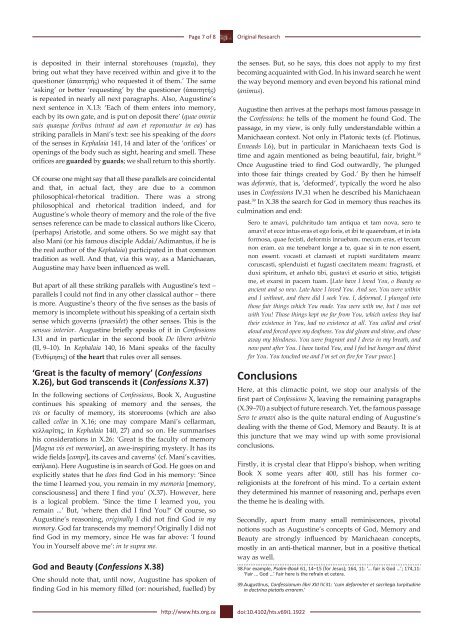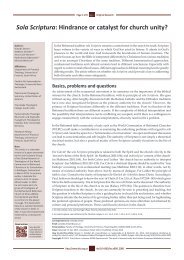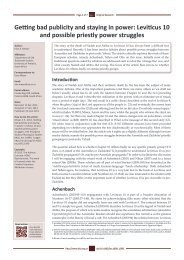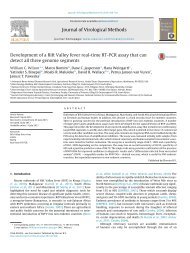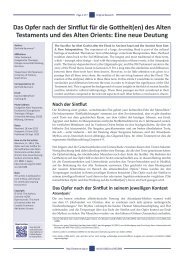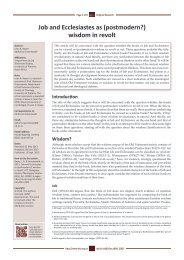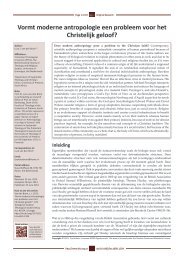A Manichaean analysis of Augustine's Confessions, Book X - HTS ...
A Manichaean analysis of Augustine's Confessions, Book X - HTS ...
A Manichaean analysis of Augustine's Confessions, Book X - HTS ...
Create successful ePaper yourself
Turn your PDF publications into a flip-book with our unique Google optimized e-Paper software.
Page 7 <strong>of</strong> 8<br />
Original Research<br />
is deposited in their internal storehouses (ταμιεῖα), they<br />
bring out what they have received within and give it to the<br />
questioner (ἀπαιτητής) who requested it <strong>of</strong> them.’ The same<br />
‘asking’ or better ‘requesting’ by the questioner (ἀπαιτητής)<br />
is repeated in nearly all next paragraphs. Also, Augustine’s<br />
next sentence in X.13: ‘Each <strong>of</strong> them enters into memory,<br />
each by its own gate, and is put on deposit there’ (quae omnia<br />
suis quaeque foribus intrant ad eam et reponuntur in ea) has<br />
striking parallels in Mani’s text: see his speaking <strong>of</strong> the doors<br />
<strong>of</strong> the senses in Kephalaia 141, 14 and later <strong>of</strong> the ‘orifices’ or<br />
openings <strong>of</strong> the body such as sight, hearing and smell. These<br />
orifices are guarded by guards; we shall return to this shortly.<br />
Of course one might say that all these parallels are coincidental<br />
and that, in actual fact, they are due to a common<br />
philosophical-rhetorical tradition. There was a strong<br />
philosophical and rhetorical tradition indeed, and for<br />
Augustine’s whole theory <strong>of</strong> memory and the role <strong>of</strong> the five<br />
senses reference can be made to classical authors like Cicero,<br />
(perhaps) Aristotle, and some others. So we might say that<br />
also Mani (or his famous disciple Addai/Adimantus, if he is<br />
the real author <strong>of</strong> the Kephalaia) participated in that common<br />
tradition as well. And that, via this way, as a <strong>Manichaean</strong>,<br />
Augustine may have been influenced as well.<br />
But apart <strong>of</strong> all these striking parallels with Augustine’s text –<br />
parallels I could not find in any other classical author – there<br />
is more. Augustine’s theory <strong>of</strong> the five senses as the basis <strong>of</strong><br />
memory is incomplete without his speaking <strong>of</strong> a certain sixth<br />
sense which governs (praesidet) the other senses. This is the<br />
sensus interior. Augustine briefly speaks <strong>of</strong> it in <strong>Confessions</strong><br />
I.31 and in particular in the second book De libero arbitrio<br />
(II, 9–10). In Kephalaia 140, 16 Mani speaks <strong>of</strong> the faculty<br />
(Ἐνθύμησις) <strong>of</strong> the heart that rules over all senses.<br />
‘Great is the faculty <strong>of</strong> memory’ (<strong>Confessions</strong><br />
X.26), but God transcends it (<strong>Confessions</strong> X.37)<br />
In the following sections <strong>of</strong> <strong>Confessions</strong>, <strong>Book</strong> X, Augustine<br />
continues his speaking <strong>of</strong> memory and the senses, the<br />
vis or faculty <strong>of</strong> memory, its storerooms (which are also<br />
called cellae in X.16; one may compare Mani’s cellarman,<br />
κελλαρίτης, in Kephalaia 140, 27) and so on. He summarises<br />
his considerations in X.26: ‘Great is the faculty <strong>of</strong> memory<br />
[Magna vis est memoriae], an awe-inspiring mystery. It has its<br />
wide fields [campi], its caves and caverns’ (cf. Mani’s cavities,<br />
σπήλαια). Here Augustine is in search <strong>of</strong> God. He goes on and<br />
explicitly states that he does find God in his memory: ‘Since<br />
the time I learned you, you remain in my memoria [memory,<br />
consciousness] and there I find you’ (X.37). However, here<br />
is a logical problem. ‘Since the time I learned you, you<br />
remain ...’ But, ‘where then did I find You?’ Of course, so<br />
Augustine’s reasoning, originally I did not find God in my<br />
memory. God far transcends my memory! Originally I did not<br />
find God in my memory, since He was far above: ‘I found<br />
You in Yourself above me’: in te supra me.<br />
God and Beauty (<strong>Confessions</strong> X.38)<br />
One should note that, until now, Augustine has spoken <strong>of</strong><br />
finding God in his memory filled (or: nourished, fuelled) by<br />
the senses. But, so he says, this does not apply to my first<br />
becoming acquainted with God. In his inward search he went<br />
the way beyond memory and even beyond his rational mind<br />
(animus).<br />
Augustine then arrives at the perhaps most famous passage in<br />
the <strong>Confessions</strong>: he tells <strong>of</strong> the moment he found God. The<br />
passage, in my view, is only fully understandable within a<br />
<strong>Manichaean</strong> context. Not only in Platonic texts (cf. Plotinus,<br />
Enneads I.6), but in particular in <strong>Manichaean</strong> texts God is<br />
time and again mentioned as being beautiful, fair, bright. 38<br />
Once Augustine tried to find God outwardly, ‘he plunged<br />
into those fair things created by God.’ By then he himself<br />
was deformis, that is, ‘deformed’, typically the word he also<br />
uses in <strong>Confessions</strong> IV.31 when he described his <strong>Manichaean</strong><br />
past. 39 In X.38 the search for God in memory thus reaches its<br />
culmination and end:<br />
Sero te amavi, pulchritudo tam antiqua et tam nova, sero te<br />
amavi! et ecce intus eras et ego foris, et ibi te quaerebam, et in ista<br />
formosa, quae fecisti, deformis inruebam. mecum eras, et tecum<br />
non eram. ea me tenebant longe a te, quae si in te non essent,<br />
non essent. vocasti et clamasti et rupisti surditatem meam:<br />
coruscasti, splenduisti et fugasti caecitatem meam: fragrasti, et<br />
duxi spiritum, et anhelo tibi, gustavi et esurio et sitio, tetigisti<br />
me, et exarsi in pacem tuam. [Late have I loved You, o Beauty so<br />
ancient and so new. Late have I loved You. And see, You were within<br />
and I without, and there did I seek You. I, deformed, I plunged into<br />
those fair things which You made. You were with me, but I was not<br />
with You! Those things kept me far from You, which unless they had<br />
their existence in You, had no existence at all. You called and cried<br />
aloud and forced open my deafness. You did gleam and shine, and chase<br />
away my blindness. You were fragrant and I drew in my breath, and<br />
now pant after You. I have tasted You, and I feel but hunger and thirst<br />
for You. You touched me and I’m set on fire for Your peace.]<br />
Conclusions<br />
Here, at this climactic point, we stop our <strong>analysis</strong> <strong>of</strong> the<br />
first part <strong>of</strong> <strong>Confessions</strong> X, leaving the remaining paragraphs<br />
(X.39–70) a subject <strong>of</strong> future research. Yet, the famous passage<br />
Sero te amavi also is the quite natural ending <strong>of</strong> Augustine’s<br />
dealing with the theme <strong>of</strong> God, Memory and Beauty. It is at<br />
this juncture that we may wind up with some provisional<br />
conclusions.<br />
Firstly, it is crystal clear that Hippo’s bishop, when writing<br />
<strong>Book</strong> X some years after 400, still has his former coreligionists<br />
at the forefront <strong>of</strong> his mind. To a certain extent<br />
they determined his manner <strong>of</strong> reasoning and, perhaps even<br />
the theme he is dealing with.<br />
Secondly, apart from many small reminiscences, pivotal<br />
notions such as Augustine’s concepts <strong>of</strong> God, Memory and<br />
Beauty are strongly influenced by <strong>Manichaean</strong> concepts,<br />
mostly in an anti-thetical manner, but in a positive thetical<br />
way as well.<br />
38.For example, Psalm-<strong>Book</strong> 61, 14–15 (for Jesus); 164, 11: ‘... fair is God ...’; 174,11:<br />
‘Fair ... God ...’ Fair here is the refrain et cetera.<br />
39.Augustinus, Confessionum libri XIII IV.31: ‘cum deformiter et sacrilega turpitudine<br />
in doctrina pietatis errarem.’<br />
http://www.hts.org.za<br />
doi:10.4102/hts.v69i1.1922


